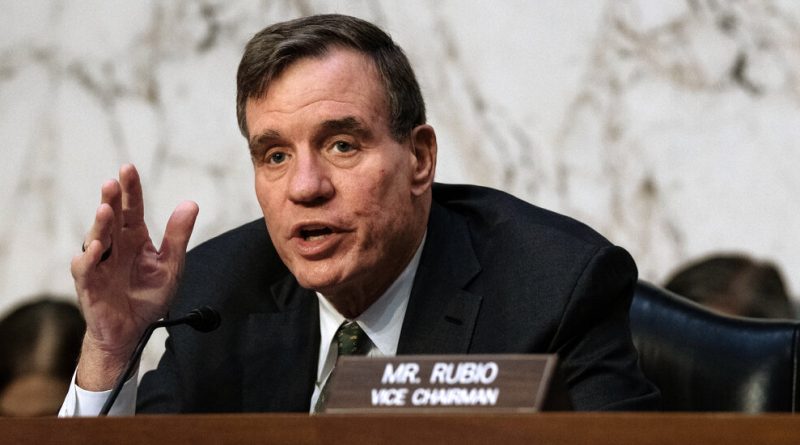Top Senator Ties Trump and Biden Classified Files to Fate of Wiretap Law
WASHINGTON — A top Democratic senator on Wednesday criticized the Biden administration for refusing to show Congress classified documents found at the homes of Donald J. Trump, Joseph R. Biden Jr. and Mike Pence, tying the renewal of a surveillance law to how forthcoming it chooses to be.
The admonition, by Senator Mark Warner, a Virginia Democrat who is chairman of the Senate Intelligence Committee, came during a hearing on worldwide threats at which top national security officials urged Congress to reauthorize the law, which is set to expire this year.
Portraying the law as a vital national security tool, the F.B.I. director, Christopher A. Wray, disclosed newly declassified information about a matter that has contributed to the debate over the reauthorization effort: how the bureau searches for information about Americans in the repository of messages intercepted without a warrant under that law, known as Section 702.
The Justice Department said last week that such queries had dropped drastically after changes to F.B.I. systems starting in summer 2021, but did not say how many there were. Mr. Wray testified that there had been a drop of about 93 percent last year, and a senior F.B.I. official later specified that estimate to be fewer than 204,090 queries.
Mr. Wray and other witnesses at the hearing, including the director of national intelligence, Avril D. Haines, portrayed preserving Section 702 surveillance as essential to addressing threats including Russia, China, hackers and terrorists. Mr. Warner told them that most members of the Intelligence Committee agreed and wanted to help make that case to senators outside the panel.
Understand the Biden Documents Case
The discovery of classified documents from President Biden’s time as vice president has prompted a Justice Department investigation.
But, he said, the Biden administration’s refusal to share the classified documents that had improperly accompanied Mr. Trump, Mr. Biden and Mr. Pence when they left office undermined the panel members’ ability to make that case.
The Justice Department has said that because the documents are evidence in open criminal investigations, it would be improper to share them with lawmakers. The Senate committee has argued that it has a right to see the materials as part of its oversight responsibility for the handling of classified materials.
The administration last week provided a limited briefing for the so-called Gang of Eight, a group of congressional leaders that included Mr. Warner and the top Republican on the committee, Senator Marco Rubio of Florida. But they were evidently not shown the files.
On Wednesday, Mr. Warner again insisted that the committee had a right to see the materials and called the administration’s position an absurdity that “doesn’t pass the smell test.”
“This trust relationship has to go two ways,” Mr. Warner said, adding: “That is not the kind of collaboration and cooperation that we expect, and it will tie and restrain our ability to make the kind of trusting relationship with the nonmembers of this committee on issues like 702.”
How Times reporters cover politics. We rely on our journalists to be independent observers. So while Times staff members may vote, they are not allowed to endorse or campaign for candidates or political causes. This includes participating in marches or rallies in support of a movement or giving money to, or raising money for, any political candidate or election cause.
Section 702 allows the government to gather from American communications companies, like Google and AT&T, the messages of foreigners abroad — even when they are interacting with Americans. Enacted in 2008, it legalized a form of a warrantless surveillance program that the Bush administration secretly began after the terrorist attacks of Sept. 11, 2001.
While Congress extended the law in 2012 and 2018, the Biden administration is expected to face steeper political headwinds this year. Civil libertarians long alarmed by the law’s privacy implications have been joined by Republicans wary of security agencies and surveillance, a sentiment stoked by Mr. Trump during the Russia investigation.
The F.B.I.’s ability to search for information about Americans in the repository of messages intercepted without a warrant has been a focus of controversy. In rulings in 2020 and 2021, a surveillance judge said that the bureau had committed “widespread violations” of limits on when its agents could query the data, leading to the changes that prompted the drop.
The senior F.B.I. official also shed additional light on querying limits that are now more rigorously enforced. Most of the time, the official said, agents working on criminal investigations cannot query the 702 repository in search of relevant evidence unless there is a foreign connection to the crime.
Specifically, the official said, only agents whose jobs focus on national security have permission to use the 702 repository. And to conduct a query, agents must also have a particular reason to believe that information relevant to the crime would be in a database of messages gathered by targeting foreigners abroad for national-security purposes.
Citing the drop in queries for Americans’ data as “a major impact,” Mr. Wray told the panel: “This is something we’re going to treat as an ongoing effort. But it is part of our focus as stewards of these important authorities to make sure that we are protecting American civil liberties — but also using the tool in a way that is so valuable to protect Americans.”
Source: Read Full Article

